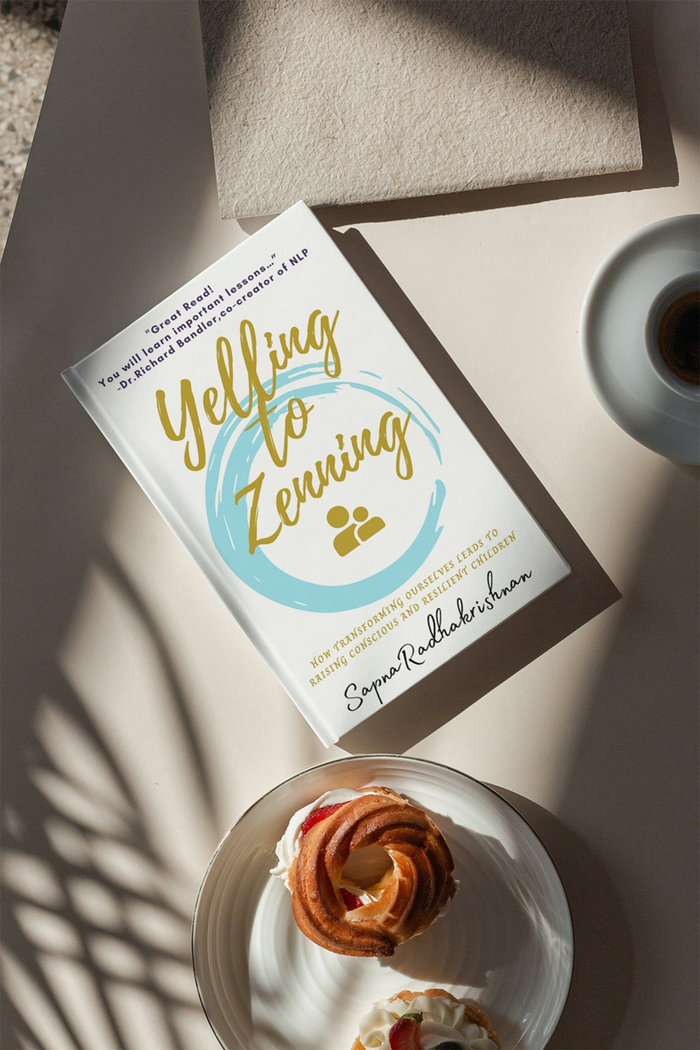By Lisa Dawson
Sapna Radhakrishnan — author, conscious living coach and neuro-linguistic programming (NLP) trainer — understands how difficult parenting can be.
For nearly 20 years, Radhakrishnan has called Frisco home and has been studying and learning the root cause of dysfunction to help parents connect with their children.
Born and raised in Bangalore, India, Radhakrishnan is also the mother of a 16-year-old son. She works with hundreds of families and observes firsthand how parents and kids struggle in their relationships. This drives her to work with them, to connect to their inner selves, find their voices and communicate.
In her recent book, Yelling to Zenning: How Transforming Ourselves Leads to Raising Conscious and Resilient Children (available on Amazon as well as through her website, sapnarad.com), she shares about her own parenting journey while teaching others how to turn inward to adopt a more peaceful parenting style.
Radhakrishnan’s journey to become trained in psychology and various healing modalities started as a young girl when she observed the adults around her. She says that as a young child, she was trying to learn the ways of the world and wanted to play, but was told she had to study to be happy when she grew up.
“I was told to focus,” she says, “but all I saw were distracted adults.”
Although Radhakrishnan, who also owns Sapna Rad Coaching, says she loved and respected the adults around her, she was often confused and her lack of attention was labeled as disrespect.
“I didn’t have the maturity or the words to express how I felt, and often saw the adults around me in distress because of their lack of communication. It’s very difficult for young children to understand the adult’s intentions behind the behavior.”

Conscious parenting
A quest for answers and a natural curiosity about the inner workings of adults and children led Radhakrishnan on her journey to what psychologists call “conscious parenting.”
She describes conscious parenting as a blend of Western psychology and Eastern philosophy, in which parents take the responsibility of raising themselves first and then connect with their child to see them for who they truly are.
“The conscious parent understands the power they have in their influence and their connection over their children,” she says, “but that they can lose that power if they soil their parenting with misplaced expectations, lack of impulse control, lack of communication or distractions stemming from their own childhood unhealed wounds. Parents can lose the ability to truly connect with their children.”
In today’s hectic, faced-paced, digital world, it is easy to understand how parents can become disconnected from their children.
The gaps in communication can work both ways: Kids may be hesitant to speak openly to their parents, and parents are overwhelmed with managing careers and families and attaining an ideal work-life balance. Add in a layer of ever-present technology and it is no wonder why communication deteriorates.
Radhakrishnan says nowadays, stress and anxiety are considered normal.
“Children are buckling under pressure and (are) unable to communicate with adults while adults are being hard on themselves trying to do it all,” she explains.
“Parenting is the toughest job in the world — even harder in the current times with phones and social media. Social media is disconnecting us more and more because it’s becoming a go-to for escape. It is distorting our view of the world and it alienates us from being present — all leading to loneliness and suppressed emotions causing health issues.”

An `inner knowing’
Radhakrishnan says parents inherently know how to connect with their children and what’s best for them, but are disconnected from that knowing.
She teaches parents to get back in touch with that inner knowing, which can become clouded by ego, fear of judgment, anxiety about the future and fear of pain.
“Instead of working on shedding their egos and fears, I encourage parents to learn about them,” Radhakrishnan says. “It’s important they know the difference between a rational and irrational fear. Parents often try to control their children in an attempt to escape their inner turmoil. But all a parent has to do is learn to connect to their inner knowing.”
When she’s not practicing conscious parenting, writing or coaching parents, Radhakrishnan enjoys traveling the world. Through travel, she says, she sees the common thread that binds us all.
“Travel helps me see the world, the different people, cultures, foods, different traditions, landscapes, history. No matter where I go, I see how similar we all are in our wants for happiness, peace, and prosperity,” she says. “No matter how different we look on the outside, our inner longing and aspirations are common all over the world. Travel helps me see how every human has the same needs and how nature has taken care of it all.”
Lisa Dawson is a freelance writer and Frisco resident.






